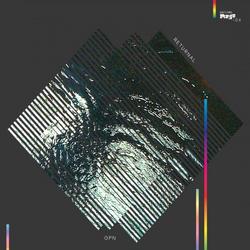Replica - Oneohtrix Point Never
$ 3.99 – $ 5.99
Replica, retro-synth drone maven Daniel Lopatin's return as Oneohtrix Point Never following his critically adored, profile-rocketing 2010 album Returnal (and his equally estimable work with Ford & Lopatin), offers repeat customers both familiarity and surprise in roughly equal measure.
In the former column, Lopatin still grounds his creations in conspicuously beautiful, buzzing, humming, and twinkling Kosmiche synthscapes; once again, everything feels draped in a syrupy, soft-focus analog glaze.
But only one track, the aptly titled "Submersible," sustains itself on warmly drifting, rhythmically unfettered synthetic sound washes alone.
Elsewhere, gentle waves of gauziness give way, more or less gradually, to more dynamic elements: on "Remember," an intertwined pair of looped vocal snippets (one speaking the track's title, the other a muffled, mutilated moan) slowly emerges from the amniotic haze; dappled pace-setter "Andro"'s undercurrent of murmuring, garbled sound scraps flips in the final 30 seconds into a stuttered, ritualistic outburst of hand percussion and jungle screeches.
By and large, though, rhythm is not merely appended to but fully foregrounded in these compositions, in a way that's essentially new for Oneohtrix -- rarely in the conventional guise of drum tracks and "beats" (though there is a stark, rudimentary one anchoring the first two minutes of "Up," which might be approximately danceable if it weren't in 7/8), but often in the form of sampled loops, creating a definite rhythmic structure without (in most cases) the use of "percussion" per se, a much calmer variation of the micro-sampling methods of Akufen and Matthew Herbert.
"Power of Persuasion" introduces this approach with a shifting series of classical-sounding (acoustic) piano figures stuck on short-circuit repeat, to placid, gently numbing effect, while the rather less somnolent "Sleep Dealer" lassoes in a wider array of thuds, groans, and whirrs along with a perky keyboard fillip, indecipherable spoken bits, and a satisfied-sounding exhalation to form a pleasantly cheery little jaunt, and the gently erratic "Nassau" adds some rustling, shuffling footsteps that sound a bit like soft-shoe tap dancing.
Even the lovely, lulling title track, which combines static buzzes and fluid, meandering melodic tones with no regular rhythmic matrix to speak of, creates a sense of gentle groove and motion in its soft, patient new age piano chords.
Apart from his usual battery of analog keyboards (and a considerable amount of actual acoustic piano), Lopatin apparently culled much of the sound for this album from a DVD compilation of TV commercials dating from 1985 to 1993.
Though it makes for an intriguing compositional back-story -- and it clearly provided him a rich sound palette from which to draw -- it's rare that that source material is specifically evident while listening; at best it functions on a more energetic, subconscious level, making the typically nebulous sonic nostalgia of the chillwave/hypnagogic pop movement -- with which these productions bear some strong commonalities -- more literally (if still somewhat imperceptibly) manifest.
| Title/Composers | Performer | Listen | Time | Size | Size | |
|---|---|---|---|---|---|---|
| 1 | AndroDaniel Lopatin | Oneohtrix Point Never | Play | 03:55 | 9 MB | 26 MB |
| 2 | Power of PersuasionDaniel Lopatin | Oneohtrix Point Never | Play | 03:29 | 8 MB | 20 MB |
| 3 | Sleep DealerDaniel Lopatin | Oneohtrix Point Never | Play | 03:10 | 7 MB | 16 MB |
| 4 | RememberDaniel Lopatin | Oneohtrix Point Never | Play | 03:19 | 7 MB | 19 MB |
| 5 | ReplicaDaniel Lopatin | Oneohtrix Point Never | Play | 04:36 | 10 MB | 26 MB |
| 6 | NassauDaniel Lopatin | Oneohtrix Point Never | Play | 04:42 | 10 MB | 27 MB |
| 7 | SubmersibleDaniel Lopatin | Oneohtrix Point Never | Play | 03:49 | 8 MB | 19 MB |
| 8 | UpDaniel Lopatin | Oneohtrix Point Never | Play | 03:57 | 9 MB | 25 MB |
| 9 | Child SoldierDaniel Lopatin | Oneohtrix Point Never | Play | 03:12 | 7 MB | 19 MB |
| 10 | ExplainDaniel Lopatin | Oneohtrix Point Never | Play | 06:45 | 15 MB | 42 MB |
| 40 mins | 94 MB | |||||
| 40 mins | 243 MB | |||||
| Artist | Job | |
|---|---|---|
| 1 | Al Carlson | Engineer, Mixing, Producer |
| 2 | Jesper Eklow | Layout |
| 3 | Virgil Finlay | Cover Illustration |
| 4 | Joel Ford | Producer |
| 5 | HFF | Back Cover |
| 6 | Joe Lambert | Mastering |
| 7 | Daniel Lopatin | Back Cover, Composer, Producer |
| 8 | Oneohtrix Point Never | Primary Artist |
| 9 | Theres Wegmann | Layout |
| Quality | Format | Encoding | Description |
|---|---|---|---|
| Standard | MP3 | 320kps 44.1kHz | MP3 is an audio coding format which uses a form of lossy data compression. The highest bitrate of this format is 320kbps (kbit/s). MP3 Digital audio takes less amount of space (up to 90% reduction in size) and the quality is not as good as the original one. |
| CD Quality | FLAC | 16bit 44.1kHz | FLAC is an audio coding format which uses lossless compression. Digital audio in FLAC format has a smaller size and retains the same quality of the original Compact Disc (CD). |




